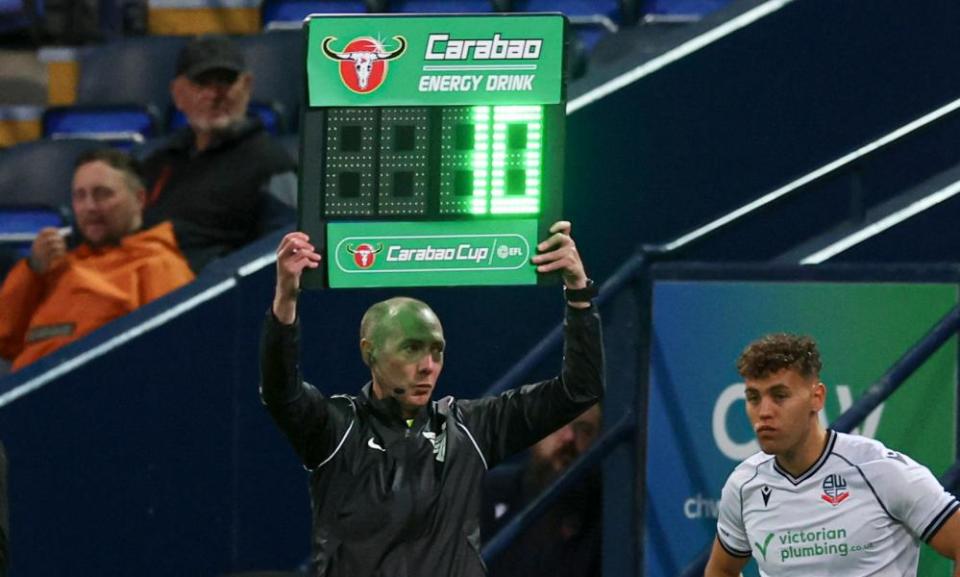‘Here for good’: Howard Webb tells clubs there is no backing down on added time

Howard Webb has warned there will be no let-up in referees’ attempts to combat time-wasting and believes their actions will make the game fairer. The International Football Association Board (Ifab) has ordered referees around the world to clampdown on time-wasting and add on the exact time taken for goal celebrations, substitutions, injuries, red cards, penalties and VAR checks. Referees would previously add 30 seconds for each goal or substitution.
An average of 16 minutes and 34 seconds was added to matches on the opening weekend of the EFL season, with 29 bookings for time-wasting compared with two on the final day of last season. Any player who stands in front of a free-kick to prevent it being taken quickly or kicks the ball away to delay a restart, for example, will be cautioned.
Related: PFA chairman warns of growing player unrest over increased added time
Several high-profile players, managers and the Professional Footballers’ Association have complained about the increased workload. But Webb, chief refereeing officer for Professional Game Match Officials Limited (PGMOL), believes the directives are here to stay and player behaviour needs to change.
“This was born out of a desire to create a fairer game, whereby the loss of time was accounted for in a more accurate way,” he said. “We’ve seen a declining trend in effective playing time and the Ifab are determined to rectify that. I’ve heard lots of noise from fans about the loss of time – we are down to 48 minutes in League Two [on average] – and we need to do more to increase effective playing time. People are paying good money to watch football and are getting a lower and lower number [of minutes] each year.
“We’re not a million miles away already. Last season, a quarter of the games in the Premier League went above 100 minutes. It’s not like the old days of one and three minutes. We are seeing more tactics designed to slow the game down.
“It’s not just about adding time on. It’s about actions we can take in the moment to deal with those tactics. We’ve got a bigger analysis team now and we’re looking to identify tactics that are used nefariously to delay the game.”
Premier League games lasted an average of 98 minutes and 26 seconds last season. According to analysis by officials, that will rise to almost 102 minutes this season once teams adapt to the clampdown. Stadium clocks will display the time played, rather than stopping at 45 and 90 minutes.
Webb said: “Based on the research we’ve done we think another three minutes will be the norm. But it depends on the game. If the game finishes 7-4 or there are 10 substitutions I would expect a lot of additional time. Even if a game is 6-0 or 7-0 we are still instructing the officials to add the correct amount of time because the first tie-breaker is goal difference. Therefore, if a team is winning 7-0 it could end up 8-0 or 9-0, it could end up being 7-2, and that could make the difference between promotion, playoff spots or relegation in the final analysis.
“We have to change mindsets. We will stick to this. We are not going to ease off. We are not going to start ignoring behaviours in October or November. This will be here for good. We have a responsibility to the game at all levels and to the future of the game to make it a better place for all participants.”
Time-wasting is not the only problem that referees intend to address. There will also be a clampdown on poor behaviour, with players booked for surrounding a referee, and in the technical area, where managers will be cautioned for leaving it to celebrate or berate a match official.
There are no plans to broadcast live audio from referees but Webb plans to explain contentious decisions in a monthly show on Premier League Productions.

